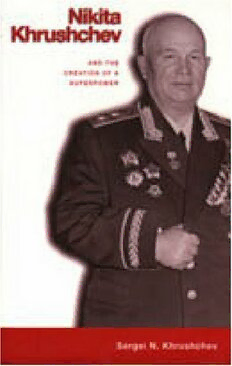Download Nikita Khrushchev and the Creation of a Superpower PDF Free - Full Version
Download Nikita Khrushchev and the Creation of a Superpower by Sergei N. Khrushchev in PDF format completely FREE. No registration required, no payment needed. Get instant access to this valuable resource on PDFdrive.to!
About Nikita Khrushchev and the Creation of a Superpower
Translated by Shirley Benson Foreword by William Taubman Annotations by William C. Wohlforth A unique account of Cold War history during the Khrushchev era by one who witnessed it firsthand at his father's side. More is known about Nikita Khrushchev than about many former Soviet leaders, partly because of his own efforts to communicate through speeches, interviews, and memoirs. (A partial version of his memoirs was published in three volumes in 1970, 1974, and 1990, and a complete version was published in Russia in 1999 and will appear in an English translation to be published by Penn State Press.) But even with the opening of party and state archives in 1991, as William Taubman points out in his Foreword, many questions remain unanswered. "How did Khrushchev manage not only to survive Stalin but to succeed him? What led him to denounce his former master [an event that some interpreters herald as the first act in the drama that led to the end of the USSR]? How could a man of minimal formal education direct the affairs of a vast intercontinental empire in the nuclear age? Why did Khrushchev?’s attempt to ease East-West tensions result in two of the worst crises of the Cold War in Berlin and Cuba? To resolve these and other contradictions, we need more than policy documents from archives and memoirs from associates. We need firsthand testimony by family members who knew Khrushchev best, especially by his only surviving son, Sergei, in whom he often confided." As Sergei says, "During the Cold War our nations lived on opposite sides of the Iron Curtain, and not only was it an Iron Curtain but it was also a mirror: one side perceived the other as the 'evil empire,?’ and vice versa; so, too, each side feared the other would start a nuclear war. Neither side could understand the real reasons behind many decisions because Americans and Russians, representing different cultures, think differently. The result was a Cold War filled with misperceptions that could easily have led to tragedy, and we are lucky it never happened. And still, after the Cold War, American-Russian relations are based on many misunderstandings." In this book Sergei tells the story of how the Cold War happened in reality from the Russian side, not from the American side, and this is his most important contribution.
Detailed Information
| Author: | Sergei N. Khrushchev |
|---|---|
| Publication Year: | 2000 |
| ISBN: | 9780271019277 |
| Pages: | 864 |
| Language: | English |
| File Size: | 6.06 |
| Format: | |
| Price: | FREE |
Safe & Secure Download - No registration required
Why Choose PDFdrive for Your Free Nikita Khrushchev and the Creation of a Superpower Download?
- 100% Free: No hidden fees or subscriptions required for one book every day.
- No Registration: Immediate access is available without creating accounts for one book every day.
- Safe and Secure: Clean downloads without malware or viruses
- Multiple Formats: PDF, MOBI, Mpub,... optimized for all devices
- Educational Resource: Supporting knowledge sharing and learning
Frequently Asked Questions
Is it really free to download Nikita Khrushchev and the Creation of a Superpower PDF?
Yes, on https://PDFdrive.to you can download Nikita Khrushchev and the Creation of a Superpower by Sergei N. Khrushchev completely free. We don't require any payment, subscription, or registration to access this PDF file. For 3 books every day.
How can I read Nikita Khrushchev and the Creation of a Superpower on my mobile device?
After downloading Nikita Khrushchev and the Creation of a Superpower PDF, you can open it with any PDF reader app on your phone or tablet. We recommend using Adobe Acrobat Reader, Apple Books, or Google Play Books for the best reading experience.
Is this the full version of Nikita Khrushchev and the Creation of a Superpower?
Yes, this is the complete PDF version of Nikita Khrushchev and the Creation of a Superpower by Sergei N. Khrushchev. You will be able to read the entire content as in the printed version without missing any pages.
Is it legal to download Nikita Khrushchev and the Creation of a Superpower PDF for free?
https://PDFdrive.to provides links to free educational resources available online. We do not store any files on our servers. Please be aware of copyright laws in your country before downloading.
The materials shared are intended for research, educational, and personal use in accordance with fair use principles.

